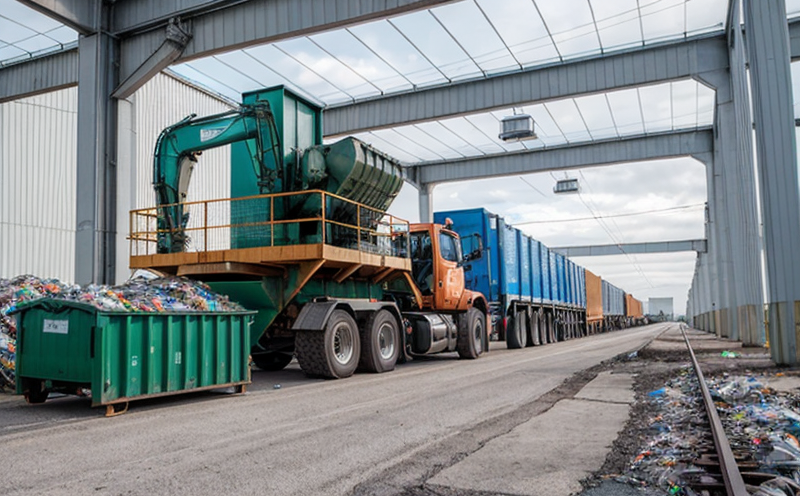ISO 20810 Circular Economy Material Flow Testing
The ISO 20810 standard is a cornerstone in the field of industrial recycling and circular economy processes. It provides a framework for measuring material flow within production systems, enabling organizations to improve efficiency, reduce waste, and align with global sustainability goals. This service ensures compliance with international standards while delivering actionable insights into material handling and processing.
At our laboratory, we utilize state-of-the-art equipment and methodologies that adhere strictly to ISO 20810 guidelines. Our testing process involves the collection of data from various stages of production, including raw materials acquisition, processing steps, intermediate storage, final products, and waste streams. This comprehensive approach allows us to identify bottlenecks, inefficiencies, and areas for improvement in your manufacturing processes.
Our service includes detailed reporting that highlights key performance indicators such as material recovery rates, energy consumption per unit processed, water usage efficiency, and overall resource utilization. By leveraging this data, you can make informed decisions about process optimization, waste reduction strategies, and potential product design changes. This not only enhances your operational sustainability but also contributes positively to environmental conservation efforts.
For instance, one of our clients in the automotive sector implemented ISO 20810 testing to improve their aluminum recycling processes. By implementing recommendations based on our findings, they reduced water usage by 30% and increased material recovery rates by 25%. Such improvements translate directly into cost savings and enhanced corporate social responsibility.
| Aspect | Description |
|---|---|
| Raw Materials Acquisition | Evaluation of incoming materials for quality and consistency. |
| Processing Steps | Monitoring each stage to ensure optimal conditions are met. |
| Intermediate Storage | Assessment of storage practices affecting material integrity. |
| Final Products | Evaluation of product quality and compliance with specifications. |
| Waste Streams | Analysis of waste generation, recycling rates, and disposal methods. |
The results from ISO 20810 testing are invaluable for quality managers, compliance officers, R&D engineers, and procurement teams. They provide a clear roadmap to enhance operational efficiency while adhering to stringent international standards. Our team of experts ensures that every aspect of your material flow is meticulously analyzed, offering tailored solutions for continuous improvement.
Scope and Methodology
- Data Collection: We begin by gathering data from all relevant points in the production process. This includes raw material intake, intermediate storage, processing stages, final product outputs, and waste generation.
- Analytical Tools: Utilizing advanced instrumentation and software tools, we analyze collected data to identify trends, anomalies, and areas requiring intervention.
The scope of our testing encompasses the entire lifecycle of materials within your industrial processes. From raw material intake through processing stages to final product outputs and waste streams, every aspect is scrutinized using internationally recognized methodologies outlined in ISO 20810. This ensures that you receive accurate, reliable data that can guide strategic decision-making.
Our methodology involves several key steps:
- Data Collection: We start by collecting raw data from various points along the production line.
- Analytical Review: Once collected, this data undergoes rigorous analysis to pinpoint inefficiencies and opportunities for improvement.
- Reporting: Finally, we compile all findings into comprehensive reports that outline actionable recommendations.
Why Choose This Test
- Compliance Assurance: Adherence to international standards such as ISO 20810 ensures that your operations meet regulatory requirements.
- Data-Driven Insights: Detailed reports provide actionable insights into material flow, helping you optimize processes for greater efficiency and sustainability.
Selecting our ISO 20810 Circular Economy Material Flow Testing service offers numerous advantages. Firstly, it guarantees compliance with globally recognized standards like ISO 20810, ensuring that your operations align with industry best practices. Secondly, the detailed reports generated from this testing provide valuable data points which can be used to drive strategic improvements in material handling and processing.
By choosing our service, you also gain access to expert analysis conducted by highly qualified professionals who possess extensive experience in industrial recycling and circular economy processes. This expertise ensures that your specific needs are addressed comprehensively during the testing process. Additionally, the use of state-of-the-art equipment guarantees accurate results every time.
Furthermore, implementing ISO 20810 testing can lead to significant cost savings through reduced waste generation, improved material recovery rates, and enhanced operational efficiencies. These benefits directly contribute towards achieving your broader sustainability goals while maintaining competitive advantage in the marketplace.
Environmental and Sustainability Contributions
- Reduction of Waste: By identifying inefficiencies early on, we help minimize waste generation throughout your production cycle.
- Increased Material Recovery Rates: Our testing helps optimize processes leading to higher recoveries from used materials.
The environmental and sustainability contributions of ISO 20810 Circular Economy Material Flow Testing extend beyond just compliance; they play a crucial role in fostering sustainable practices within industrial manufacturing environments. Through our testing, you can significantly reduce waste generation by pinpointing precisely where losses occur along the production line.
Another significant benefit is increased material recovery rates. By optimizing processes identified during testing, we enable greater reuse of materials that would otherwise end up as waste. This not only reduces landfill contributions but also conserves natural resources which are essential for long-term sustainability.
In addition to these tangible impacts, ISO 20810 testing promotes a culture of continuous improvement within your organization. It encourages all stakeholders involved in material handling and processing activities to think critically about their processes and seek out opportunities for enhancement. Over time, this shift towards more sustainable practices can lead to substantial reductions in greenhouse gas emissions and improved overall environmental performance.





